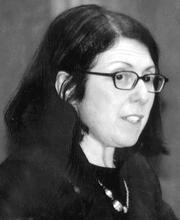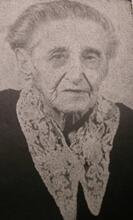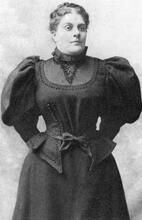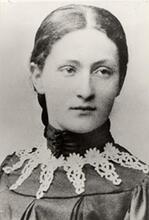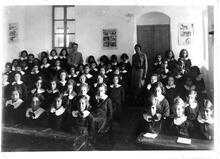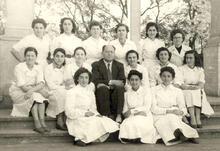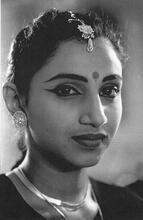Angèle Guéron
From 1909 to 1915, Angèle Guéron directed one of the largest Jewish girls’ schools in the Ottoman Empire. In late 1912 and early 1913, she kept a journal that documented the fate of her besieged city—Edirne (now in northwestern Turkey)—during the Balkan Wars. In addition to providing a rare glimpse of local life during the siege, it documents a Sephardi woman’s Ottoman patriotism in the face of resistance from a communal patriarchy. Guéron’s journal also contains remarkably insightful observations on political changes that were sweeping her region, namely the decline of multi-national empires, the rise of modern nation-states, and growing expectations for citizens to identify with their countries in unprecedented ways. During World War I, local Jewish leaders effectively forced Guéron to leave Edirne.
Childhood and Early Career
Angèle Guéron (née Cohen) was born in Istanbul, capital of the Ottoman Empire, on August 6, 1886. She was a Descendants of the Jews who lived in Spain and Portugal before the explusion of 1492; primarily Jews of N. Africa, Italy, the Middle East and the Balkans.Sephardi Jew whose first language was, presumably, Ladino (Judeo-Spanish).
Much of Guéron’s life story was shaped by the Alliance Israélite Universelle. Based in Paris, this international Jewish organization ran a network of Francophone schools in North Africa, the Middle East, and the Balkans. Jewish communities in these regions were impacted by the content of the Alliance curriculum but also by the organization’s insistence on extending education to girls—something it began to do in the 1860s.
As a child, Guéron completed her studies at an Alliance girls’ school in Istanbul. As a teenager, she was selected to attend an Alliance boarding school in Paris that trained teachers for its vast educational network. In 1904, she was sent to teach at an Alliance girls’ school in Tunis, capital of what was then the French Protectorate of Tunisia. In 1905, she was transferred to two different Alliance schools in Istanbul. In 1906, she was charged with running the Alliance girls’ school in Ottoman Haifa (today in Israel).
First Years in Edirne
The most dramatic part of Guéron’s career occurred in Edirne, an important Ottoman city located 150 miles northwest of Istanbul. It was home to roughly 55,000 Muslims, 20,000 Jews, 20,000 Orthodox Greeks, 20,000 Bulgarian Christians, and 6,000 Armenian Christians. In 1909, Guéron became director of Edirne’s Alliance girls’ school, which counted nearly 600 students. Only 23 years old, she was running the third-largest girls’ school in the Alliance network.
Compared to her female predecessors, Guéron was a headstrong manager who ran the school with little deference to local Jewish notables. This was probably a function of her personality and, to some degree, the political and cultural climate in Edirne after the 1908 Young Turk Revolution.
For centuries, the Ottoman Empire had allowed Jews and Christians to run their communal affairs with some autonomy in a system that, by and large, provided physical security without equality. (Islam was officially superior.) A system of equal citizenship was introduced in the mid-nineteenth century. Between 1908 and 1912, Young Turk leaders strove to further this project and integrate citizens of all religions into Ottoman society through a modern regime of individual rights and civic responsibilities. Across the empire, freedoms of the press and association created new possibilities for women’s advocacy (among other things). For example, in 1908, Muslim, Christian, and Jewish women in Edirne founded an association to help female residents enter the workforce.
In this context, Guéron fared better with Ottoman authorities than with leaders of the Jewish community. Her early work at the school impressed Edirne’s Director of Public Education. After she hired the school’s first Turkish-language teacher, a woman named Ramzi Hanim, Guéron was lauded by the governor and other members of the Committee of Union and Progress (the most important political party of the time). But her independent management style rankled certain people in Edirne’s Jewish community. According to complaints made to the local Ladino newspaper and Alliance higher-ups in Paris, she jealously guarded her school’s financial records, eliminated a home economics course, and refused to favor the daughters of notable families.
Soon, tragedy in Guéron’s personal life provided grist for the mill of her enemies. In March 1910, she separated from her mentally unstable husband—one Dr. Algranti—and the man committed suicide days later. In September 1911, she married Isaiah Guéron, a fellow Sephardi Jew who worked for a European financial institution known as the Ottoman Bank. Community members whispered that it was too soon. It did not help that she was known to be cavalier in her observance of the Jewish sabbath.
In 1911, Guéron led efforts to create a local Jewish orphanage, but she was soon kicked off the steering committee. In 1912, the editor of Edirne’s Ladino newspaper started a campaign to remove her from the girls’ school. An Alliance investigator from Paris wrote that Guéron’s chief adversaries were some notable Jewish women who found the young educator “arrogant.”
The Balkan Wars
Before the campaign against Guéron could achieve its end, Edirne was gripped by war. In October 1912, Bulgaria, Serbia, Greece, and Montenegro launched a coordinated attack against the Ottoman Empire, thereby starting the Balkan Wars (1912-1913). While most of Edirne Province was quickly occupied by Bulgarian forces, the city of Edirne held out for another five months. This grueling episode, known as the Siege of Edirne, entailed a blockade, artillery shelling, and the world’s first aerial bombardment of a city.
Much of what historians know about life in Edirne during the siege comes from Guéron’s French-language journal. Addressed to Alliance leadership in Paris, it documents her prescient political insight, her Ottoman patriotism, and her power struggle with the local Jewish patriarchy (though, as mentioned above, her relationship with notable Jewish women was also fraught).
In her first journal entry, Guéron describes the “endless line of carriages” taking women and children to the train station, from where they departed for the safety of Istanbul. Some of these people, including Guéron’s mother and sister, were Jews. But most were Muslim. Guéron likens these refugees to the hundreds of thousands of Muslims who had fled Bulgaria during the Russo-Ottoman War of 1877-1878, many of whom still lived in Edirne at the start of the war. These elderly residents were now watching history repeat itself, and in their eyes Guéron saw “tacit acceptance” of the same “cruel law” that had forced them south in 1877. Guéron was describing what statesmen would soon call the “unmixing of peoples” and what is today called ethnic cleansing. This grizzly practice would only intensify in the Balkans and Anatolia over the next ten years. Indeed, as countries began to negotiate a series of so-called “population exchanges,” the phenomenon described by Guéron literally became law.
The journal continues to describe the first weeks of war, when Guéron joined the Red Crescent Society, volunteered at Edirne’s military hospital, and had her students sew bandages for wounded soldiers. Assisting her was the director of another Alliance girls’ school. For their efforts, the two Jewish women received a letter of recognition from the governor. (Meanwhile, the director of Edirne’s Alliance boys’ school abandoned his post and fled to Istanbul.)
Guéron had to contend not only with Bulgarian shelling but also with opposition from local Jewish leaders. When she moved her students’ sewing workshop from the school to the military hospital, the local chief rabbi and the above-mentioned newspaper editor both objected, implying that it was neither safe nor seemly for Jewish girls to work so close to male soldiers (most of whom were Muslim). A few months later, when much of the Jewish community had crowded into a few large bomb shelters near the center of town, Guéron proposed that long-awaited donations from international Jewish organizations be disbursed to community members in the form of foodstuffs, as cash would feed the rampant gambling that plagued the shelters. Her proposal was dismissed by the rabbi and the editor. The two men—who also professed to be Ottoman patriots—did not resent Guéron’s politics so much as her breaking of traditional gender roles. But the patriotic nature of her supposed transgressions put them in a very awkward position.
As it exists in the archive of the Alliance, Guéron’s journal ends on March 27, 1913—the day after Edirne capitulated to Bulgarian troops. Reportedly, some local Christians celebrated the end of the siege and the arrival of Bulgarian rule (which would turn out to be brief). But, like most of the Jewish community, Guéron mourned the Ottoman defeat. “So many brave men have fallen without saving Turkey [i.e. the Ottoman Empire] from this painful amputation,” she wrote, in reference to Bulgaria’s annexation of Edirne. “The wound will long continue to bleed...”
A slightly different version of Guéron’s journal exists in a 1914 yearbook from the Jewish community of Thessaloniki, Greece (which had been Ottoman Salonica until 1912). Published under the pseudonym “Ben Israel” (son of Israel/the Jewish people), it is unclear who submitted it and why a pen name was used. This version continues into the spring and summer of 1913, when the city of Edirne was occupied by Bulgaria and then retaken by the Ottoman Empire. In one of the last entries, the author reflects on the return of the Ottomans and the departure of the Bulgarians, noting that the former could learn a few things from the latter. For example, just as the Bulgarians had required everyone to speak Bulgarian, the Ottomans would do well to make all Edirne residents use Turkish (instead of Greek, Armenian, Ladino, French, and other languages associated with minority communities). Assuming that these entries were written by Guéron—which seems likely but not certain—they add a layer of nuance to her worldview. Like other Ottoman citizens who penned reflections on the Balkan Wars, Guéron’s patriotic feelings for the empire may have come with a belief that it urgently needed to change.
World War I and Occupied Istanbul
Ultimately, Guéron’s personality was better suited for the rigors of the siege than the subtle politics that followed. In 1915—months after the Ottoman Empire entered World War I on the side of the Central Powers—she had a dispute with Alliance leadership over a potential transfer. Meanwhile, her enemies in the local Jewish community had resumed their campaign to have her fired. Unable to surmount this combined hostility, she lost her job.
By 1916, Guéron’s husband had been enlisted in the Ottoman army, and she was trying to support her three children by working part-time in a local government school. She sought help from Gertrude Elkus, wife of Abram Elkus, the United States Ambassador to the Ottoman Empire and an American Jew. The ambassador petitioned on Guéron’s behalf with Alliance leadership in Paris and the Ottoman chief rabbi in Istanbul. It is unclear whether these efforts succeeded in winning some financial support for the former Alliance school director.
In any case, Guéron and her family soon moved to Istanbul, which fell under Allied occupation after World War I. In 1919, she asked the Alliance if she could direct the girls’ school in Ortaköy, an Istanbul neighborhood on the European shore of the Bosporus. At that point, however, her file in the Alliance archive comes to an end.
According to one of her living relatives, Guéron’s “short life” came to an end when she caught cholera on a sea voyage. She was one of many passengers who suddenly succumbed to the disease, and her body was thrown into the Mediterranean. It is unclear whether she died before or after the Republic of Turkey was founded (in 1923). Regardless, one wonders how she would have evaluated life in that country.
Almanach national au profit de l’hôpital de Hirsch (Thessaloniki, Greece: 1914).
Archive of the Alliance Israélite Universelle (AAIU), Paris.
Bali, Rifat. “Edirne Muhasarasi Sirasinda Tutulmus Bir Günlük—I.” Tarih ve Toplum 32, no. 190 (Oct. 1999): 35-43.
Bali, Rifat. “Edirne Muhasarasi Sirasinda Tutulmus Bir Günlük—II.” Tarih ve Toplum 32, no. 191 (Nov. 1999): 15-24.
Bali, Rifat. “Edirne Muhasarasi Sirasinda Tutulmus Bir Günlük—III.” Tarih ve Toplum 32, no. 192 (Dec. 1999): 26-30.
Bali, Rifat. “Edirne Muhasarasi Sirasinda Tutulmus Bir Günlük—IV.” Tarih ve Toplum 32, no. 193 (Jan. 2000): 34-38.
Bulletin de l’Alliance Israélite Universelle, Troisième série, no. 34 (Paris: 1909).
Ginio, Eyal. The Ottoman Culture of Defeat: The Balkan Wars and their Aftermath. Oxford: Oxford University Press, 2016.
Guéron, Angèle. Journal du siège d'Andrinople: 30 octobre 1912-26 mars 1913. Istanbul: Isis Press, 2002.
Haker, Erol. Edirne, its Jewish Community, and Alliance Schools, 1867-1937. Istanbul: Isis Press, 2006.
Levy, Avigdor. “The Siege of Edirne (1912-1913) as Seen by a Jewish Eyewitness: Social, Political, and Cultural Perspectives.” Jews, Turks, Ottomans: A Shared History, Fifteenth through the Twentieth Century, ed. Levy. Syracuse, NY: Syracuse University Press, 2002.
Rodrigue, Aron. French Jews, Turkish Jews: The Alliance Israélite Universelle and the Politics of Jewish Schooling in Turkey, 1860-1925. Bloomington, IN: Indiana University Press, 1990.
Rozental, Izel. “‘Zavallı Ancel’ Halam.” Shalom, June 16, 2021.


